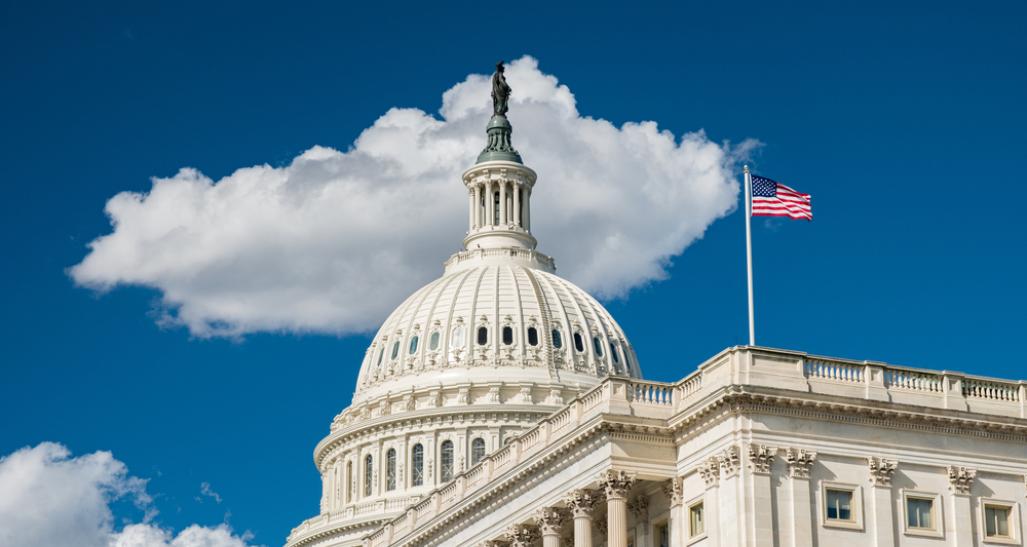
Good government doesn’t just happen, according to NRF Senior Vice President David French. “I like to say good government is a contact sport,” French says on this episode of Retail Gets Real. “You have to play to win, you have to be engaged and you have to be present in the policy debates.”
For retailers large and small, this means getting involved in opportunities like the upcoming Fight Retail Crime Day on October 26 and other engagement opportunities NRF creates, including industry fly-ins and hosting store tours with members of Congress. “These kinds of tools are the most important and effective way to get to positive policy outcomes in Washington,” French says.

Retailers will have plenty of opportunities to get engaged this fall. Now that Congress is back from recess, the clock is ticking to make progress on a number of bills that could have a profound impact on retailers, their employees and their communities — fighting organized retail crime, taming excessive credit card swipe fees and even facing another potential government shutdown.
“They’ve got 12 legislative days to fund the government before the end of the fiscal year,” French says. “It’s kind of hard to see how they do it without kicking the can into October or even November. Every time they have to pass what’s called a continuing resolution to straight-line fund the government for a few days or a few weeks while they negotiate — every one of those instances has the potential for a government shutdown to emerge.”
One of the most important and difficult issues facing retailers right now is organized retail crime. Last year, NRF helped pass the INFORM Act, which makes it harder to resell stolen products on online marketplaces. Now NRF is supporting the Combating Organized Retail Crime Act, which would create federal resources to help put the ringleaders behind ORC gangs in jail. The bill is currently pending in both the House and Senate.
Check out NRF’s action center and take a stand with your industry on issues that matter to you most.
Another key piece of legislation that would impact retailers is the Credit Card Competition Act, which was reintroduced in the House and Senate this summer. The legislation would address credit card “swipe” fees and allow retailers to route transactions over competing networks that offer lower fees and improved security. The prices on these swipe fees, which credit card companies set and retailers have to pay, have gone up 60% since the beginning of the pandemic, with further price increases planned for October.
“Credit card processing fees last year totaled about $126 billion, so it’s a big number,” French says. “Our estimate is that if the bill becomes law, retailers and our customers will enjoy about $15 billion in savings because of the increased competition.”
Listen to the episode to learn more about the policies impacting retailers, the prospects for immigration reform and tax reform, and how NRF is advocating on behalf of the industry. Visit nrf.com/takeaction to learn more about how you can get involved and make a difference.
Episode transcript, edited for clarity.
Bill Thorne: Welcome to Retail Gets Real, where we hear from retail’s most fascinating leaders about the industry that impacts everyone, everywhere, every day. I’m Bill Thorne from the National Retail Federation, and on today’s episode, we’re going to be speaking with NRF’s Senior Vice President of Government Relations, David French. And we’re going to be talking about the retail industry’s top policy priorities.
As Congress returns from August recess, it will be considering policies that could have a profound impact on retailers, their employees and their communities. We’re going to ask David about important issues such as fighting organized retail crime, taming excessive credit card swipe fees, and the prospects of immigration reform.
Amidst all of these deliberations, the looming threat of a potential government shutdown casts a shadow and how [it] might that impact the retail sector. We’ll also share how retailers can affect meaningful change in the industry through collaborative efforts. David French, my friend and my colleague, welcome back to Retail Gets Real.
David French: Thanks, Bill. It‘s great to be back on my favorite retail podcast.
Thorne: Among your list of many, I am sure. It’s going to be a really busy fall. I think there are years where we say, “Well, you know, we’re hoping that several things are going to happen or break one way or the other.” I think this fall, in particular, it’s full steam ahead as soon as they get back, so let’s set the scene on what Congress is expected to tackle right after returning from August recess.
French: Well, so today’s September 12th, so the House comes back into session today. They’ve got 12 legislative days to fund the government before the end of the fiscal year. It’s kind of hard to see how they do it without kicking the can into October or even November. Every time they have to pass what’s called a continuing resolution to straight-line fund the government for a few days or a few weeks while they negotiate — every one of those instances has the potential for a government shutdown to emerge.
Obviously, we don‘t want to see a government shutdown. We like business as usual. It’s the holiday season for retail, so keeping government open, funded, stable, removing some of the controversy from this, is always in our best interest. But it‘ll be an interesting couple of weeks while they sort things out before the end of the fiscal year.
Thorne: Are you pretty certain that they will sort it out? I mean, or is it just going to be a short term, short term, short term?
French: I think it‘ll be short, short term, short term, short term. They will sort it out. The great thing about our system of government is that after they‘ve tried all the other options, they eventually come to the right decision. And they will in this case as well, but there may be some interruptions along the way.
Thorne: Yeah, so we’ve got a lot of things going on as it relates to legislative policy that impacts the retail industry specifically. I’m going to pull out one that we’ve been talking a lot about and we’ve been hearing a lot about from all of our retailers, from the leadership, and that is organized retail crime.
Now there is a bill that’s out there that’s being that has been introduced to address this problem and my understanding is that we’re having an October 26 “Fight Retail Crime Day” for Congress. So both of those things, CORCA — the bill — and Fight Retail Crime Day. What are those?
French: Let‘s go back to last year when we helped to get the INFORM Act passed and the INFORM Act brought transparency to online marketplaces. [It] required sellers to disclose more about who they were in third-party online marketplaces and that brought a little bit of sunlight to what had become somewhat of an environment of illegal goods, stolen goods being moved in less than transparent ways to unsuspecting consumers.
That law has been in effect now for about two months. As enforcement of that law takes effect and continues to spool out, we’re going to see some of those online marketplaces become harder places to sell stolen goods. Well, that’s a great thing.
The next step is making sure that state and local prosecutors are putting the criminals in jail. What we’ve called for is passage of the Combating Organized Retail Crime Act (CORCA). It would create federal resources to help build complex cases against the kingpins behind some of these theft rings that have been plaguing retailers across the country.
Thorne: And so what is this Fight Retail Crime Day that NRF is doing?
French: Last year, we helped to create a social media holiday to focus attention on the urgent need to solve this problem, to pass a bipartisan bill. We chose October 26 on the calendar, and we’re coming back this year to do it again. It’s again mostly in social media space, but it helps us to drive the message of the need to pass the CORCA bill.
Thorne: When we do these events, we bring retailers in. We literally put them together with the elected officials. Does that have a real impact in terms of making it something that is real for these members of Congress?
French: So, I like to say good government is a contact sport. Good government doesn‘t just happen. You have to play to win, you have to be engaged, and you have to be present in the policy debates. Things like the Fight Retail Crime Day, other fly-ins that we host, other engagement opportunities we create, help to make sure that retailers are on the same page, are talking about the same things at the same time, and bringing to life the real stories that people are experiencing in the retail sector and communities around the country. These kinds of tools are the most important and effective way to get to positive policy outcomes in Washington.
Thorne: I think that the one thing I always remind people and why it’s so wonderful to represent this industry is there is not a member of Congress, not an elected official — whether in the municipal, the state or the federal level — that does not have a retailer in their district or in their state. They obviously have a personal relationship with retailers, whether they shop there or they’re just friends with them, they go to church with them or they remember them from the Chamber. So it’s wonderful when we have the opportunity to remind members of Congress that these bills and these policies don’t just have an impact on the industry. They have an impact on that store that’s on that Main Street in the city, in the town, in which they live.
I must give credit where credit is due, which is our government relations team has done a phenomenal job in the past of really marrying the people that are down on the ground doing the work with the elected officials to make it a very real situation so that when they think about it, they think about in terms of people and not just policy.
French: We are the largest private-sector employer in the country. Retail employs directly and indirectly 52 million Americans. On top of that, we have a direct line to our customers. We know more about how our customers are thinking, feeling, shopping. And those two things give us a lot of policy impact in Washington.
The NRF‘s job is to help focus that impact and direct it towards specific policy objectives and we‘ve been very successful in recent years advancing some of our prime goals. We feel very good about the environment that we have today. We‘ve been talking about the Combating Organized Retail Crime Act, but I‘d like to talk about the Credit Card Competition Act.
Thorne: I think that’s an important thing for us to talk about because it really does have some real-world implications on consumers and retailers alike. So David, what is the Credit Card Competition Act?
French: It‘s a bipartisan measure that‘s been introduced in the House and the Senate that would for the first time require that the credit card duopolies compete. The way it would require these duopoly players — Visa and Mastercard — to compete is it would require them to provide a second option for routing transactions over their networks. Routing transactions so that an alternative network could be used.
Thorne: What’s the situation right now? How does that work? If I go into the store, I use my credit card. What happens?
French: If it’s a Visa card, it goes over the Visa network. If it’s a Mastercard, it goes over the Mastercard network and the banks charge prices that are set by Visa and Mastercard. The prices have gone up 60% since the beginning of the pandemic and the credit card companies are planning new price increases for October.
Thorne: Now, is, are these prices increases on the consumer or is this on the seller and the merchant?
French: On the seller and the merchant, yes.
Thorne: OK. But it does have real implications for the consumer as well?
French: Of course, because like all costs that the retail industry sees, these costs end up finding their way into the cost of goods and into the final price of products. We estimate that American families pay about $1,000 a year more for goods because of credit card fees. By the way, they pay these higher prices for these goods regardless of whether they shop with a credit card.
Thorne: So the bill itself would then introduce … it’s kind of a competitiveness to the swipe fee?
French: Yes. It would require that a second independent network be offered as an option for the retailer to choose. Choice is really important here because choice enables the retailer to get better service, more reliable security, a higher degree of security, and also potentially a lower price.
It doesn’t require the price to be lower. But competition, as we’ve seen in every other sector where competition is vibrant, we see lower prices and better service. We think that would be good for the credit card sector as well.
Thorne: I’ve seen it referred to as the Big Box Bailout Bill. Is this just impacting the big box stores?
French: No, it affects every retailer, large and small. For most retailers, it’s the second largest cost in their business. The smallest retailers actually pay a higher price proportionally than the largest retailers.
Thorne: When I go to get gas or I go into a restaurant, sometimes there’s a price difference. If I pay cash, it’s going to be this. If I pay, if I use my card, it’s going to be that. Is this a direct result of that?
French: Yes. Especially for gasoline retailers. They have tried to get some differential pricing based on cash versus credit. That is certainly one place you’ve seen it.
Thorne: I guess because of the monopolistic nature of these networks, there really is no negotiation, I’m assuming …
French: There‘s no negotiating. You pay the price that‘s set by the duopolies.
Thorne: What is the timing of this legislation? Is it bipartisan?
French: We’ve got great sponsors in the House and Senate. The Senate bill, in fact, has been offered as an amendment. This summer it was offered as an amendment to a different piece of legislation. Senator Marshall and Senator Durbin, our chief sponsors in the Senate, got an agreement that there will be a vote on this bill sometime this year, so we’re working very hard with our small businesses, with our larger businesses, to spread the word and build support for the Credit Card Competition Act so that it can pass the Senate this fall.
Thorne: If I recall correctly, Marshall is a Republican, Durbin is a Democrat, so you do have both sides of the aisle covered.
French: Absolutely.
Thorne: Yeah, I mean, that‘s critically important.
French: We also have Senator Welch in Vermont, a Democrat, and Senator J.D. Vance in Ohio, a Republican. Again, it’s a very, very bipartisan, common-sense piece of legislation.
Thorne: That’s fantastic. I have a feeling, David, that the banks and the card companies aren’t just going to let this happen.
French: I think you’re right there.
Thorne: How many billions does that represent in terms of what they’re taking in because of these monopolistic networks?
French: Credit card processing fees last year totaled about $126 billion, so it’s a big number. Visa and Mastercard account for the lion’s share of those credit card processing fees. Our estimate is that if the bill becomes law, retailers and our customers will enjoy about $15 billion in savings because of the increased competition.
Thorne: That is substantial. I can see why they’re very interested in stopping it. I can see why we’re very interested in getting it passed.
David, I think that if we had been recording this 20 years ago, one of the issues and policies we would have been talking about is immigration reform. And here we are, talking about immigration reform again. What does workforce and immigration reform look like in this Congress?
French: Right now, immigration reform in this Congress looks like border security first — and then we’ll negotiate other things like visa programs, streamlining the employer verification system, dealing with childhood arrivals without proper paperwork or the so-called DACA problem. That’s what it looks like today.
But if you looked at Congress from outer space, and you looked at all these pieces, you’d say to yourself, “This is really easy to solve. You take a little bit of this and a little bit of that, you put it together and there’s a deal.”
But politics sometimes has different plans. This is an area where the politics of border security are really effective for Republicans, and they’re using it very effectively to drive a message that works for them politically, but has a tendency to make getting to a common-sense solution very, very hard.
NRF and our colleagues in the business community are advocating for common-sense solutions here. Border security is absolutely part of the solution. But we have to realize that we have a very dynamic economy that demands a diverse set of workers, and the U.S. economy can’t furnish all of those workers by itself—whether it’s high skill immigrants from other parts of the world, whether it’s people who are trained in U.S. universities with graduate degrees and PhDs who can’t stay because they can’t get a visa to stay in the United States, or whether it’s low-skill workers that want to work in the United States for a few years and then go back home.
We should be able to solve these problems. There is a solution. Getting politics out of the way or solving the politics on the way to a common-sense solution is really what’s tricky.
Thorne: We’re in the presidential election cycle. We’re in election cycles it seems like non-stop — but in a presidential election cycle, in particular — how do you overcome the political view of everything that is presented in terms of policy? If, politically, it’s not something that they want to undertake or tackle, is it just dead?
French: No. Look, I‘m the most optimistic person in Washington. I believe that there’s a solution. I think it comes from people who need to be engaged, being engaged, and making the case again and again and again. It seems frustrating, but it’s worth it in the long run. I said this beginning, or I said this earlier: Politics is a contact sport.
The more often lawmakers hear from employers in their district about how hard it is to fill certain jobs because there just aren’t enough workers in the economy, I think that does get through eventually.
I think people get frustrated with politics for the sake of politics, and oftentimes they are looking for solutions, but it’s going to take leadership. Sometimes [in] a presidential election year, [it] is difficult for leaders to emerge. But what happens after a presidential election is often really important. In fact, historically, the best legislating — the most transformative legislating — happens right after a major presidential election. If we were to look for a time when we’re going to tackle some major problems, that’s something to keep in mind.
The 2024 election is going to happen. Perhaps there’s a consensus. Perhaps there’s a landslide election, and we have a consensus around a certain set of policies. That’s when leaders emerge and our goal at NRF is to work to advance those policy objectives, piece by piece, so that we’re ready in 2025 so that we can make a difference. I really want to put our shoulder to the wheel in 2025 and try to get some major things done, whether it’s immigration reform or [some other thing.]
Another thing that we should be paying attention to, Bill — and certainly we’re talking to our members about this — tax reform is probably going to be on the agenda in 2025. Whoever wins the 2024 election is going to come in and there are fiscal realities we’re going to have to deal with. That is going to involve the tax code and retailers have a lot at stake in how we reform the tax code.
Thorne: Yeah, it’s amazing. Tax reform. It was just one of those things that came up every once in a while. Now it seems to come up every other year, but it’s important. It’s incredibly important. The implications are vast in terms of the people that they impact and the industries that end up really footing the bill for a lot of changes that are made, maybe not in such a good way. A lot of what we have to do, I would assume, at the NRF, is to protect some advances that we’ve made recently and making the tax code more fair for our members and for the people that work for them and for the communities that they serve.
Thorne: David, we talk about the fact that there are retailers in every community that any policymaker represents. So how do we as the National Retail Federation get people engaged in the debate [and] in the discussion about the impacts that these policies and these pieces of legislation might have on the communities and the retailers that serve them?
French: Yes, Bill. We have a variety of resources available at NRF. I think the first thing is to go to our website and visit NRF dot com slash take action to view the NRF Action Center. There are a number of grassroots campaigns you can participate in. It takes less than a minute and you can send a message to lawmakers. We’ll capture your interest and then we’ll continue to engage you throughout the year.
Another tool that you can use — host a store tour. We take lawmakers to stores in their communities all the time. We’d love to have your local lawmaker come see your store.
Then finally, we have Retail PAC Direct, which is a way that you can directly invest in the political campaigns of lawmakers who are speaking out on behalf of retail. There are a lot of different ways, a lot of different tools. It starts by just raising your hand and saying, “I want to get involved.”
David French, it is always a pleasure talking with you. Thank you for joining Retail Gets Real today.
French: Thank you, Bill. Always a pleasure.
Thorne: And thank you all for listening to another episode of Retail Gets Real. You can find more information about this episode at retailgetsreal.com. I would highly encourage you to learn more about the issues that we spoke about today — visit NRF.com. I’m Bill Thorne. This is Retail Gets Real. Thank you for listening.

The retail industry impacts everyone, everywhere, every day.
NRF’s podcast features unfiltered, insightful conversations with the industry’s most interesting people. Hear retail executives, industry experts, entrepreneurs and influencers discuss trends, their career stories and the future of retail.
Subscribe to NRF's Retail Gets Real podcast
Apple | Spotify | Google


